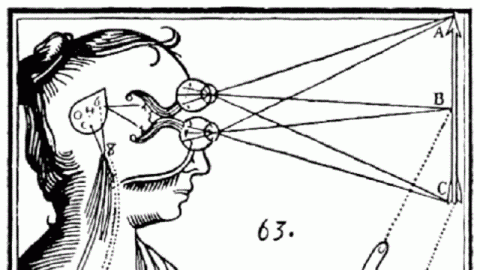The Illusion of Conscious Will

The following is a guest post by Mark Molloy
“Sir we know our will is free, and there’s an end on’t.” (Samuel Johnson as quoted by J. Boswell in The Life of Samuel Johnson, LL.D. 1791)
“The conviction that a law of necessity governs human activities introduces into our conception of man and life a mildness, a reverence and an excellence, such as would be unattainable without this conviction.” (A Einstein, 1931)
–
Common sense tells us that free will exists. Could anyone possibly deny something so obvious?
Yes. And many have.
Ancient Hindu, Buddhist and Taoist texts, for example, give voice to deterministic ideas. In Western thought, determinism dates back at least to the Presocratics (5th century BCE), and resurfaces periodically thereafter in philosophical and scientific texts. Even within the Judeo-Christian tradition — founded, in a sense, on the notion of individual choice and responsibility — Moses Maimonides, John Calvin and others have succumbed to determinism when confronted with the logical implications of deistic omniscience.
I recently finished Daniel M. Wegner’s The Illusion of Conscious Will (MIT Press, 2002), a review of the scholarship in consciousness studies, to get a sense of the contemporary case for determinism. What follows is a brief overview of the arguments Wegner presents.
Consciousness is a complex process — too complex for anyone, most likely ever, to fully understand. “When you multiply 3 times 6 in your head,” Wegner writes, “the answer just pops into mind without any indication of how you did that” (67). Neither science nor any other institution or domain can claim to fully understand the workings of the human mind (or the mind of any other species for that matter).
We nevertheless feel that we understand consciousness at an intuitive level. This intuition arises in part from the correspondence between thought and action: the thought that we will soon act does regularly precede the act itself. And yet it is important to remember that correlation does not imply causality; just because X regularly precedes Y, even if X always precedes Y, that does not necessarily prove that a causal relation exists between the two. Wegner gives the following example: “Although day always precedes night… it is a mistake to say that day causes night, because of course both are caused in this sequence by the rotation of the earth in the presence of the sun.” (66)
And indeed, upon closer analysis, there are instances in which thought does not precede action, where the correspondence between thought and action breaks down. For example, hallucinations, dissociative identity disorder, crowd behavior, imaginary companions, spirit possession, hypnosis, sleep, etc. A good deal of Wegner’s book is devoted to the analysis of these neurological anomalies, which unquestionably do complicate the picture.
With respect to free will, the question, then, is not “what comes first, the thought or the action,” but “is the fact that thoughts (often) precede action proof that they are its true cause?”
The most direct approach to the question is through biology. Nervous impulses cascade through our brains and bodies causing actions. Do our thoughts exist independently of these nervous cascades? Or does prior nervous activity precede thought and thus cause it? This simple dichotomy is fundamental. For free will to exist, it ostensibly mustbe the case that thoughts function independently of biological nervous activity. Free will advocates thus posit an agent — the “self,” or the “I” — that exists independent of the laws of physics, that participates in the world without the world being able to participate in it.
Determinists have no need to invoke this trans material agency. The perception that thought precedes action is, they argue, no proof that thought actually causes action. Instead, determinists argue that prior nervous activity determines all nervous activity, including conscious thoughts. Consciousness emerges from nervous activity, not the other way around.
Determinists find in evolutionary biology a powerful tool to explain consciousness. For while neither determinists nor advocates of free will can explain exactly how consciousness works (how we multiply 3 times 6 in our heads, for example), natural selection does provide a mechanism by which the nervous system could have been deterministically sculpted into this specific configuration. The pressure is, as always, survival. The inner workings of consciousness are as inaccessible to nervous systems (our material selves, minus the “agency”) as they are to the investigations of “agents.” And yet, natural selection and the swiftly complexifying world of social interaction demand that nervous systems find ways to make sense of sensory stimuli so as to better navigate and interact with the world. Nervous systems gain an enormous practical advantage by assuming the simplest possible explanation. This is true of all concepts: we abstract onto our sensory perception to perceive objects such as “house,” “pencil,” etc. The situation is exactly the same with consciousness itself: faced with bundles of atoms and nervous activity, nervous systems simplify and assume that each is a single, distinct entity: i.e., an agent.
Wegner closes his text by arguing that the intuition that we have free will may in fact bean emotion, not the state of abstract “knowledge” we assume it to be (akin to our “knowledge” that the Yankees should, or should not, win the world series, not to our knowledge that the angles of a Euclidean triangle sum to 180 degrees). Consciousness itself, Wegner argues, evolved to help us interact with the world and demarcate what we can and cannot influence within it. The emotion of freely willing, it is argued, evolved to compound this effect, “brand[ing] the act deeply, associating the act with self through feeling, and so render[ing] the act one’s own in a personal and memorable way.” Wegner continues:
In the same sense that … trembling alerts us that our bodies are afraid, the experience of will reminds us that we’re doing something. Will… makes the action our own far more intensely than a cold thought alone… we resonate with what we do, whereas we only notice what otherwise happens or what others have done. (325-27)
The world is still very much what it has always seemed to be, even if it in fact is not. Make of it what you will.
Mark Molloy is the Reviews Editor for MAKE: A Literary Magazine.
Image via Wikipedia Commons





